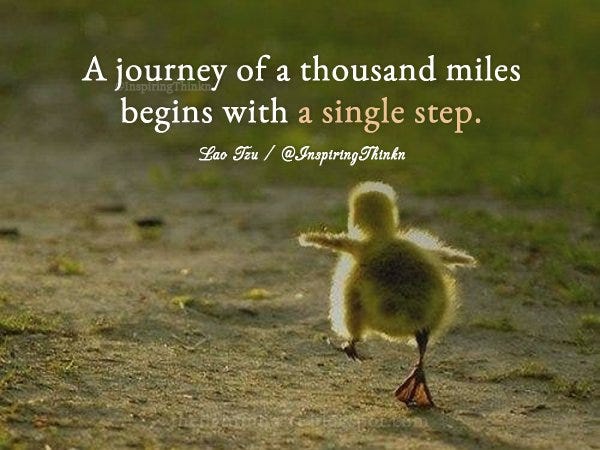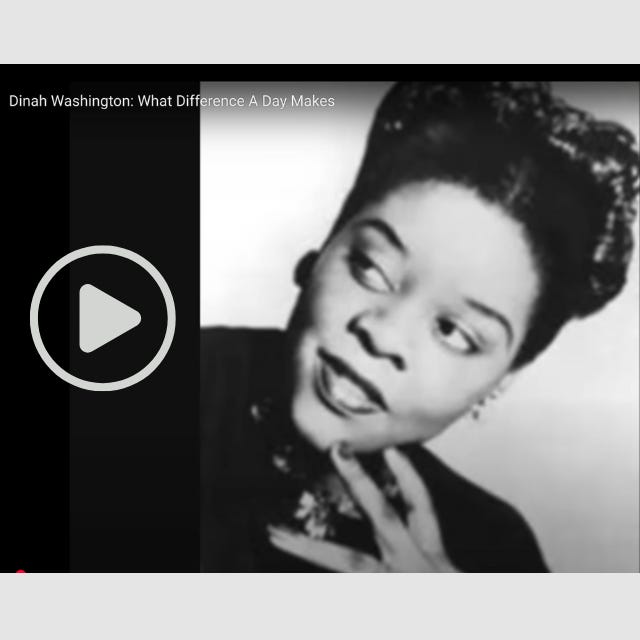What a Difference a Day Makes
On Boycotts, Word to Dinah Washington

Happy Women's History Month! Have you started reading Practicing New Worlds (PNW)? Let us know how it's going and any passages you're thinking about in the comments. So far, I'm making my way through the intro. (Confession: I'm a slow reader who spends a lot of time savoring language and taking notes.) But my mind is already abuzz, and I know there will be lots to discuss at the end of the month. By the way, mark your calendar and register for the March Zoom call. We're excited to announce Andrea Ritchie, PNW's author, will be joining us. You don't want to miss it!
So I was barely into the third page of the intro, and could already see why PNW is the book we need to read now.
"Andrea lets us in on a conversation among all kinds of people doing this work, about how the small, relational, and visionary moves we make can accumulate, converge, and ultimately shift culture at the largest scale. This is how change has happened, both in abolition work and throughout human history."
–Alexis Pauline Gumbs
I immediately related it to the 24-hour boycott, which had just ended. Online, as with most anything these days, the analysis and critique of the boycott was already in full swing. Stories about the main organizer were dropping, including The Man Behind the 'Economic Blackout' Served Time for a Sex-Related Offense (note: The link points to a NYT article that requires a subscription), and there was the revelation, covered in this Time article, Meet The People’s Union USA, the Movement Behind the Feb. 28 ‘Economic Blackout, that he’d raised close to $100K.
Now is where I have to be completely honest. I wasn't as concerned about the details of what appeared to be some shadiness surrounding John Schwarz, aka @theonecalledjai, as I was concerned that the details emerging could derail what had just started. And what we desperately needed was a place to start. Something tangible to do.
Leading up to Friday there was a lot of skepticism and doubt about the boycott. And while I understood the logic behind the critiques, what I hoped is that it wouldn't dissuade people from participating even though people weren't entirely wrong when they challenged the action by asking:
"What good would 24 hours do when people would spend what they were going to spend in the days before or immediately after anyway?"
"We need to shut down the economy." | Like a general strike. I agree and said as much shortly after the assault on Gaza began in 2023. Back then, I felt only something like a general strike could effectively demonstrate that we weren't going to stand for our tax dollars being used to buy bombs to kill babies.
"We need clearer goals and better organization to help those who can't afford to participate." | Allllll of this is true. And I love that we are already taking notes from the Montgomery Bus Boycott and how they provided care for each other as they took on the system.
While I didn't disagree with any of the principled critiques, I also knew: "THAT wasn't THIS." At least not yet. We simply weren’t there. How could we be?
But the 24-hour boycott was a significant action to support right now. [And it must be noted the soil was ripe for the seed because of the effort led by Black women to boycott Target.]
I was immediately drawn to the idea of a boycott, any boycott really, which I wrote about in this post.
What a difference a day made/24 little hours…”
– originally written in Spanish by María Grever,
famously covered by jazz legend Dinah Washington
But Alexis Pauline Gumbs's quote explains why the 24-hour boycott was brilliant. It was small (24 hours is a small length of time), it was relational (in the sense that we have relevant connections (members of the 99%) or dependency (whether we have realize it or not we are all dependent upon each other in an economic sense and other deeply important ways). I would even argue it was visionary in the way it tapped into the zeitgeist of this specific moment when so many eyes are trained on billionaires, specifically the one ransacking the government.
What Did We Accomplish

Disruption. And that is no trifle. Admittedly, I haven't looked at any analysis in terms of numbers. But crunching the numbers isn't the most crucial point. Not by far.
What we disrupted was our default, and when I say our, I mean the our comprising the 99% of American society. I mean those in the early stages of radicalization, if they've even started the process. I mean those not accustomed to interrogating capitalism, let alone knowing that racism is its essential ingredient. I mean folks who have never heard Ruth Wilson Gilmore talk about organized abandonment or realize they've been, we've all been, abandoned for decades. I mean those who believe people who are unhoused or belong to communities crumbling from the intentional withholding and theft of resources are to blame for the economic violence they experience because of laziness, poor choices, or not working hard enough.
And I also mean the our that has already been radicalized to some degree, and know capitalism is killing us and the planet, the only place we all call home. The people who have at least some understanding of capitalism's complicity in every social ill and maybe even understand we should never talk about capitalism without calling it by its full name, racial capitalism.
The people who, despite knowing this, still haven't meaningfully extracted themselves, to the extent they are honestly able, from capitalism's tentacles. People who may feel guilty but haven't made the leap to act consistently and with discipline.
That would be me. While I have been effectively boycotting Walmart for years, up until right before the election, I kept a cart full of stuff on Amazon. I have (until it expires in May) a Prime Membership. Like so many others, I reasoned that I didn't have the time to find what I wanted elsewhere and certainly couldn't find it cheaper or with free* shipping. Amazon had entrenched itself in my life by excelling at the clickable ease convenient to individuals but catastrophic to the masses.

And even though it was only 24 hours, I will die on the hill that Friday, February 28, 2025 was a necessary and important step. Even the critics and detractors of the boycott have helped place capitalism, and even more importantly, consumerism, firmly in the crosshairs of our conversations. Of course, this small step can't be (won't be!) the only step or the last thing we'll ever need to do. But it happened. We did that. (And in the case of Target, we are still doing it!)
And yes, we must (we will!) do more. But within the we is the I. The effect we want (eventually) that speaks to the billionaire class has to start inside ourselves. Individually, we must interrogate not only capitalism as a destructive death-dealing force, but we must interrogate, with brutal honesty, our proclivities.
We must confront ourselves when we use consumerism as entertainment in ways that fill empty spaces inside of us. We like to joke about retail therapy even while knowing deep down that what we need is not the distraction or dopamine hit of a purchase. Nor do we really need the spark of self-satisfaction that comes from making a "smart" purchase and finding a cheaper price than others. We must recognize how using our dollars to collect status symbols creates categories and classes that automatically and falsely pit others below us. We must reckon with using what we own to announce or validate our sense of worthiness. That's where we must start.
The good news is, just like with the boycott, we don't have to do everything at once, and we don't have to eradicate all we need to do within ourselves before we start to take small steps toward definitive action.
More than a disruption of the economy, the 24-hour boycott was about shaking up the conversations among each other and within ourselves. That's what happened. It was a start. A "small, relational" start. Like Dinah Washington sings in the last line of the song:
"What a difference a day made/and the difference is you*"
*Of course, Dinah Washington is singing about a romantic interest, but here I mean both you as in "I" and you as in "we." The collective. We are and will always be the difference.
In solidarity and love,
connease





